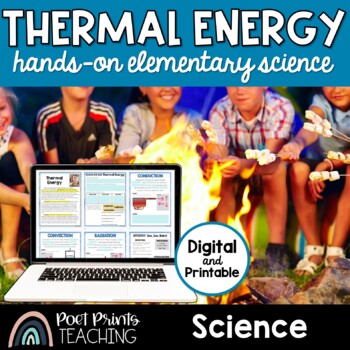Thermal Energy Science Unit
- PDF
- Google Apps™

What educators are saying
Also included in
- This is a BUNDLE of 5 hands-on science units that are perfect for Grade 3. All grade 3 science lessons are aligned to the British Columbia Grade 3 BC Big Ideas and NGSS. Each science unit includes detailed lesson plans so you don't have to create them! This bundle covers all of the Grade 3 BC BigPrice $34.99Original Price $48.00Save $13.01
Description
Learn about how thermal energy (heat energy) is produced and transferred with this fun and hands-on thermal energy science unit for elementary featuring three experiments, guided lessons, vocabulary cards, non-fiction reading, a word wall, and summative and formative assessments!
Each lesson in this unit includes a complete teaching guide with detailed set-up instructions and thorough lesson plans. Take back your nights and weekends and let us do the planning for you!
Aligned to the British Columbia, BC Big Ideas, NGSS, and Ontario Science Curriculum
Included in this hands-on Thermal Energy Science unit is…
- Day-By-Day Teachers Guide - A daily lesson breakdown for using all parts of this resource in nine 45-60 minute science lessons! The planning is all done for you. ✏️
- Introductory Worksheets - Introduce students your new topic to your students and remind them of what they know about thermal energy using the pages in this section of this packet. Choose the page(s) in this section that work best for your class. Have students brainstorm what they already know about how heat transfers and do some simple research to discover a little bit more. Try doing this part in pairs or small groups!
- Vocabulary - Vocabulary word wall cards using the major vocabulary from this Thermal Energy unit. Vocabulary words in this unit include the terms: conductor, insulator, joules, molecule, thermal energy, thermometer, conduction, convection, radiation, gas, liquid, solid . This section also includes a vocabulary worksheet and a fun classroom activity. A single-page student reference sheet is also included.
- Nonfiction Reading - No Textbook? No Problem! This resource includes a nonfiction reading passage all about Thermal Energy written at a third grade level. This section also includes a corresponding reading response worksheet!
- Lesson: Conduction, Convection, and Radiation - This teacher-led lesson teaches the difference between conduction, convection, and radiation. An exit ticket is included to assess understanding.
- Experiment: Ice, Ice, Baby - In this experiment, students will conduct thermal energy with their own bodies as they attempt to melt an ice cube (brrr)! This experiment also includes a simple experiment worksheet to complete along the way and a rubric for easy assessment.
- Experiment: Conductor or Insulator? - In this experiment, students will use various materials to cover a glass beaker of warm water to keep the water at the warmest temperature possible! This is a hands-on chance to see which materials are conductors and which are insulators. This experiment also includes a simple experiment worksheet to complete along the way and a rubric for easy assessment.
- Experiment: Lights Off! -In this experiment, students will explore the ways that different light bulbs give off thermal energy. Does it change from light bulb to light bulb or are all bulbs the same? This experiment also includes a simple experiment worksheet to complete along the way and a rubric for easy assessment.
- Review Materials - The blank study guide can help students to recall information from this unit and organize the information onto a single page sheet. In the Mixed Up Puzzles activity Students will cut out each puzzle piece, match words and definitions, and glue each pair on a large sheet of construction paper. The study cards are similar to traditional flash cards. Use the templates to create cards to help students remember key vocabulary from the unit. Use the blank page to add your own vocabulary words!
- Quiz - The quiz can be used as summative assessment at the end of the unit or formative assessment mid-way through to see which concepts needs to be covered in greater detail.
ALSO INCLUDES a Google Drive version of all student worksheets, experiment pages, and review activities that can be uploaded to Google Classroom for paperless practice and virtual learning. See all digital pages in the video preview!
This packet also includes an answer key for each quiz, student page and guided worksheet.
Looking to teach more about energy? Try our Forms of Energy & Energy Transfer Unit!
Looking to teach more Science in BC that aligns to the BC Big Ideas? I've got you covered! Check out this discounted bundle of BC Big Ideas Science for Grade 3!






